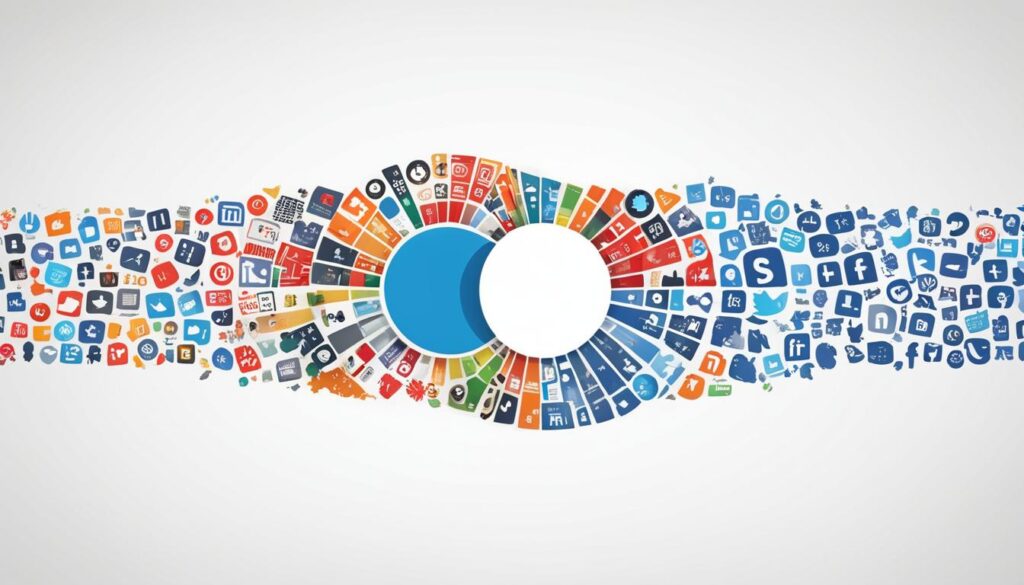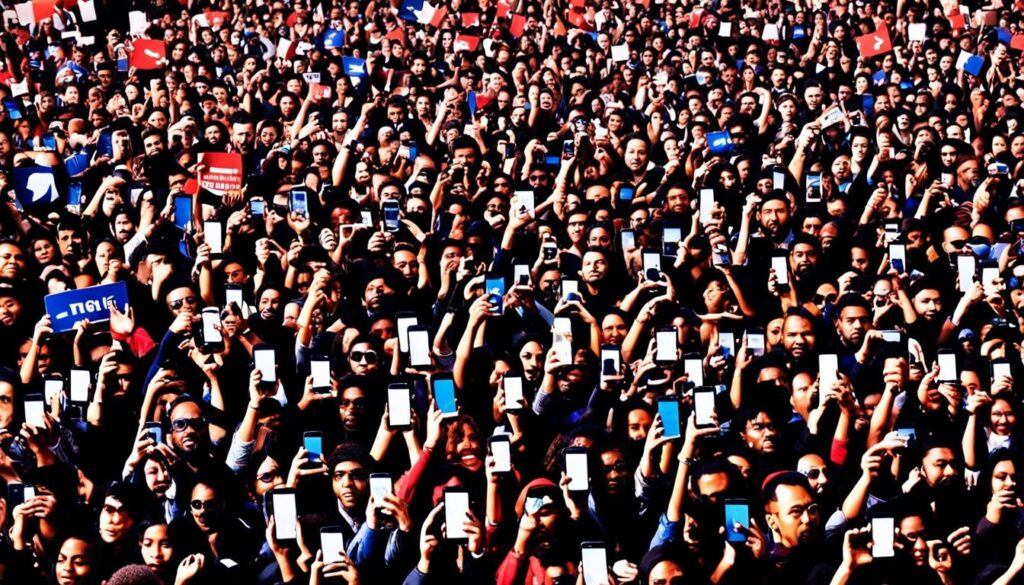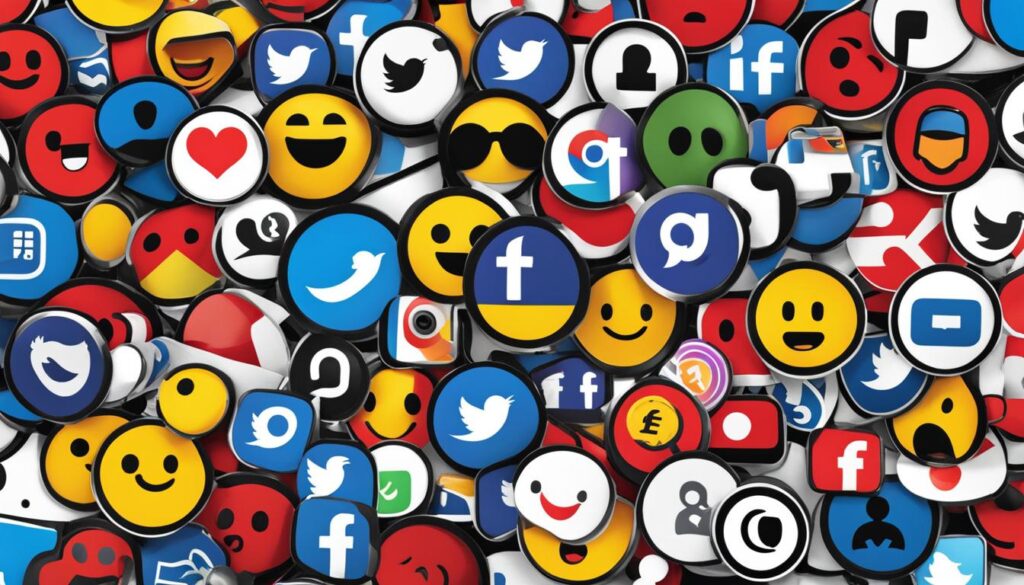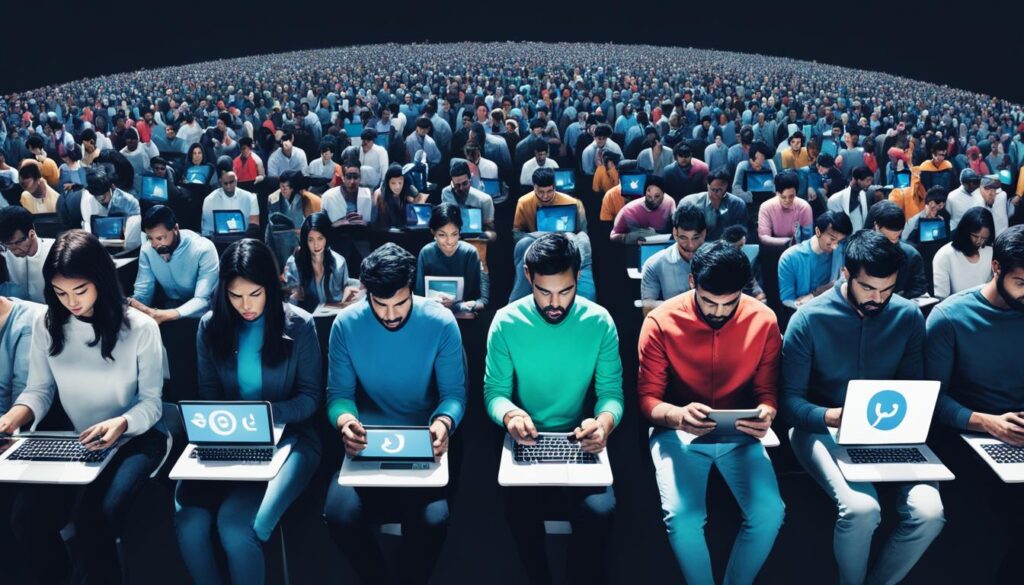As a writer deeply embedded in the fabric of digital communication, I’ve observed how the tendrils of social media have intertwined with the everyday lives of people globally. It’s clear that we’re witnessing significant societal transitions orchestrated by these platforms. Social media’s impact resonates through every layer of society, challenging the norms of engagement and altering the channels through which we consume information. The societal consequences of social media are a mosaic of both opportunity and tribulation, reflecting the complex nature of its influence.
In my exploration of this phenomenon, it has become apparent that the role of social media cannot be painted in black or white; rather, it summons a spectrum of grays. With each like, share, and post, cultures collide, opinions are shaped, and movements are birthed, attesting to the power social media and its influence hold within our modern-day society.
Table of Contents
ToggleKey Takeaways
- The pervasive reach of social media has crafted a new societal narrative.
- It has democratized information and reshaped how communities interact.
- Social platforms are battlegrounds for both constructive dialogue and divisive rhetoric.
- The influence of social media extends beyond casual networking into shaping cultural and political landscapes.
- Mitigating the spread of misinformation is an escalating concern tied to the rise of social media.
- Understanding the dual-effects of social media can inform more responsible usage and regulation.
An Overview of Social Media’s Role in Modern Democracy
The impact of digital platforms on the political landscape is profound, and as I delve into the complex dynamics of social media in the realm of democratic discourse, a multifaceted picture emerges. A notable majority, indicated by 57% across a survey of 19 countries, recognize social media as a force for democratic good. This sentiment, however, is not ubiquitous—reverberations of skepticism echo through countries such as the U.S., Netherlands, and France.
These varying perceptions align closely with citizens’ sense of political efficacy—their belief in their own ability to influence political processes. Nations like Singapore are optimistic about social media’s value in enhancing democracy, while others harbor concerns about its potential to perpetuate misinformation. This dichotomy suggests that while social media democratizes communication, it also poses significant risks.
Age plays a crucial role in shaping one’s viewpoint on the social media effects on communication within the purview of democracy. Younger individuals often view the burgeoning social media’s influence on culture and politics as a positive development. In contrast, the older demographics are more likely to approach social media with a degree of caution, potentially due to a heightened awareness of the platform’s capability to spread false information.
This complexity is further illustrated through a comparative data table I’ve compiled, showing the contrasting views between younger and older demographics regarding social media’s impact on democratic processes:
| Demographic | View on Social Media’s Role in Democracy | Concerns about Misinformation |
|---|---|---|
| Younger Age Group ( | Generally Positive | Less Concerned |
| Older Age Group (> 35 years) | Mixed, with a lean towards cautious or negative | More Concerned |
It’s clear that as the digital age continues to evolve, so too does the landscape of democracy, undeniably sculpted by the ever-expanding reach of social media platforms. As an advocate for democracy, I recognize the importance of responsible and informed engagement, ensuring that while we appreciate the connectivity provided by these platforms, we remain vigilant against the potential abuse and propagations of falsehoods that threaten the integrity of our democratic institutions.
The Perceived Impacts of Social Media on Societal Development
The fabric of society has witnessed considerable transformations due to social media—alterations that are both palpable and subtle in their influence. As a professional copywriting journalist, I have seen firsthand how the democratization of information accessibility through social media is steering societal changes. This paradigm shift has effectively diminished the once-prominent role of traditional gatekeepers of information, facilitating a more inclusive conversation that marks a significant milestone in the societal impact of online platforms.
While the voices that can now be heard are more diverse, the risk of misinformation has also multiplied, raising legitimate concerns about the integrity of public discourse and the societal consequences of social media. That said, the impact of this technological shift is not uniform across all strata of society. Let’s delve into the nuances that characterize the variances in the perception and influence of social media on different demographic segments.
Trends in Technological Connectivity and Public Perception
The surge in technological connectivity has elicited a mixed public perception. The assertion that social media has made the public more susceptible to manipulation is not unfounded. There is a clear apprehension surrounding the ease with which misinformation can sway public opinion, a threat that looms large over the communal landscape.
Linking Information Accessibility to Societal Changes
In the same breath as the aforementioned concerns, it is also vital to acknowledge the role of social media in rallying people behind meaningful causes, shining a light on global crises, and integrating a wealth of perspectives into mainstream conversations. The resultant societal changes underscore the profound ways in which the impact of online platforms on society is continuously redefining our world.
Understanding the Diverse Effects on Demographics
Diving deeper into demographic differences, it becomes evident that younger generations are more inclined to embrace the communal advantages of social media. They see these platforms as expansive bridges to international insights and a means to connect globally. In contrast, older populations may appreciate the information flow but often dismiss social media’s significance on their personal enlightenment. This difference is even more pronounced among various educational backgrounds, where the higher-educated cohorts exhibit a keener awareness of how social media can potentially be wielded for societal manipulation.
In my reporting, I have observed how these perceptions can affect the broader landscape of societal changes due to social media. Thus, it is undeniable that social media’s omnipresence has had a polarizing effect, influencing people’s views and behaviors that in turn fashion the contours of societal evolution.
Assessing the Duality of Social Media’s Influence on Culture

Social media has cemented itself as a pivotal force in sculpting cultural landscapes across the globe. Its power lies not only in its ability to connect disparate communities but also in how it serves as a breeding ground for the spread of both progressive ideas and unverified information. As an avid observer of these platforms, I’ve witnessed firsthand the cultural impact of social media, observing how it facilitates the exchange of diverse cultural expressions that enrich our lives.
However, the societal consequences of social media are multifaceted. While it encourages cultural democracy by allowing all voices to be heard, it also has the capability of magnifying voices that sow discord. The conflicting roles social media plays are evident in the table below, which juxtaposes its positive cultural contributions against its potential for harm.
| Positive Cultural Contributions | Potential for Harm |
|---|---|
| Encourages creative expression | Spreading of misinformation |
| Promotes global cultural awareness | Amplification of hate speech |
| Facilitates communal support and solidarity | Enhances polarization and echo chambers |
| Enables social activism and civic engagement | Degrades dialogue quality with anonymous trolling |
The social media’s influence on culture cannot be downplayed. Constructive dialogues often emerge from the unique intersections that these platforms provide; they are akin to digital crossroads where art, music, literary works, and philosophical thoughts converge, appealing to a wide array of interests and fostering mutual understanding.
“Social media can act as a lens, magnifying both our best and worst cultural traits. Its capacity to either bridge or divide largely depends on us, the users.” – Reflecting on social media’s cultural role
Nevertheless, I find it impossible to ignore the darker shades of social media’s spectrum. When unchecked, these platforms can rapidly disseminate divisive content, undermining the fabric of our collective cultural values. To preserve the positive aspects of social media while mitigating its harmful effects requires constant vigilance and an understanding of its dual nature.
Exploring the Impact of Digital Platforms on Political Engagement
In unraveling the nuanced dynamics of the role of social media in society, it’s evident that digital platforms have significantly reshaped political engagement. As a participatory conduit, social media beckons a closer examination of its pervasive influence—both the momentum it imparts on democratic involvements and the concerns it invites regarding reliable representation.

How Online Interactions Shape Political Discourse
My analysis begins with the recognition that online political interactions are not mere extensions of traditional political activity but rather definitive elements shaping the current political climate. The accessibility afforded by social media offers a compelling blend of immediacy and breadth, enabling real-time discussions and debates across geographical borders.
Analysing Patterns in Political Participation through Social Media
Patterns of social media use uncover a significant evolution in how individuals interact with political narratives. Trends point towards an emerging shift where engagement doesn’t just stop at content consumption but spans to activism and advocacy. Social media’s capacity to magnify voices has a tangible effect on mobilizing support for causes, legislation, or political figures. However, these very patterns that empower also tend to leave users vulnerable to misinformation, challenging the quality of political discourse.
As we venture further into this digital age, the imprint of social media on political processes will only deepen. Recognizing its transformative presence is key to maximizing its benefits while mitigating risks associated with this powerful medium.
The Influence of Social Media on Society
As we continue to navigate through the digital era, the democratization of information stands as one of the remarkable societal changes due to social media. This evolution in information sharing has reshaped how we access knowledge, engage with content, and participate in cultural discourse. With social media’s influence on culture being so significant, it’s not an exaggeration to say it has altered the very fabric of our daily lives, fostering growth in community connectivity and offering a space for cultural expression and identity exploration.
The Good: Democratization of Information and Growth of Connectivity
The unparalleled access to information thanks to social media platforms has empowered individuals from all corners of the world. Marginalized voices are now heard on a global scale, and the awareness around pressing global issues has surged, leading to the mobilization of social justice movements and the spread of influential ideas across diverse cultures. My experience as a journalist confirms the vital role of social media in these societal shifts, as I’ve witnessed its power to connect individuals, build communities, and promote collective action.

The Bad: Misinformation, Manipulation, and Societal Divisions
However, the negative influences of social media cast a significant shadow on the societal landscape. It’s disheartening to acknowledge, but these platforms often perpetuate misinformation, facilitate manipulation through rumors or fake news, and contribute to deepening societal divisions. As an active participant in public discourse, I’ve seen how these adverse effects challenge social media’s capability to serve as equitable arenas for public discourse. This necessitates a robust discussion about regulations and the ethical implications of their use in order to protect the integrity of our digital communal spaces.
It’s clear that as much as social media has revolutionized communication, the journey is fraught with complexities. I believe that addressing these challenges head-on is essential for creating a more informed, less divided society where every individual can benefit from the positive aspects of these powerful platforms.
Navigating the Challenges of Misinformation and Digital Credibility
As we charter through the expansive digital landscape of social media, we encounter a multifaceted predicament: the surge of misinformation and the erosion of digital credibility. The societal consequences of social media cannot be overstated, especially when considering the profound impact of inaccurate information that cascades unchecked across platforms, often blurring the lines between fact and fiction.

I believe that to navigate this terrain, we must endorse a culture of critical thinking and verification. Anecdotal evidence and viral stories, which once may have been harmless, now fuel conspiracy theories and false narratives with consequences that ripple through the fabric of society. In my observation, this has instigated calls for an increase in government oversight, aiming to protect public interest and restore digital credibility.
Simultaneously, users are growing more aware of the need to corroborate information, demanding higher standards of accountability from content creators and platforms alike. This discernment in the digital domain is vital to combat the pervasiveness of deceptive content and to mitigate the societal consequences of social media. It is a tightrope walk between upholding freedoms and constraining fabricated content that can cause tangible harm.
| Challenge | Community Impact | Potential Solutions |
|---|---|---|
| Misinformation | Distortion of public understanding, political polarization | Enhanced fact-checking measures, digital literacy programs |
| Conspiracy Theories | Erosion of trust in institutions, societal divisions | Transparency from authorities, counter-narrative campaigns |
| False Narratives | Spread of fear and misinformation, public deception | Stricter platform regulations, community reporting tools |
As we strive toward upholding digital credibility, it becomes clear that the path forward involves a collective effort. Social media companies, policymakers, and users must join forces to create resilient structures against misinformation in social media. The integrity of the information ecosystem underpins the health of our democracies, our communities, and our individual discernment. With concerted actions, we hold the keys to lessening the societal fallout and ensuring the flow of trustworthy communication.
Social Media’s Effect on Mental Health and Personal Wellbeing
The modern era has ushered in revolutionary communication methods, with social media platforms at the forefront, reshaping not only how we interact but also impacting our inner lives. The exploration of social media’s impact on mental health has become an essential research area as we strive to comprehend the consequences of our increasingly digital existence.
While it is evident that social media effects are manifold, a nuanced understanding is critical in discerning its influence on personal wellbeing. My focus is on unpacking the layers of this complex relationship between screen time and mental state, emphasizing the influence of social media on personal wellbeing.
Exploring Correlations Between Social Media Usage and Mental Health
Recent studies suggest that there is more at play than mere coincidence when looking at the time spent on social platforms and the prevalence of mental health issues. The seemingly innocuous acts of scrolling and liking manifest in deeper psychological patterns, with users often left grappling with a multitude of emotions, from envy to inadequacy. It is my intention to delve into these correlations, dissecting the elements that contribute to an increasing number of individuals suffering from depressive symptoms and anxiety linked to their online lives.
Addressing the Phenomenon of Social Comparison and Online Image
The digital realm, especially social networks, stages a continuous performance where the highlight reel of people’s lives steals the spotlight. This social comparison phenomenon, magnified by the curated images and narratives, provokes in many users a profound sense of self-doubt. Acknowledging this toxic environment, I’m compelled to explore how the relentless pursuit of online validation clouds our self-awareness and, ultimately, our happiness. Let us consider how the drive to maintain an idealized online image might actually detract from a healthy sense of self-esteem.
The table below encapsulates the stark contrasts between users’ perceptions of their reality versus the filtered snapshots of others’ lives that flood their feeds. It illustrates a trend: as the frequency of social media usage climbs, so does the propensity for mental health deterioration.
| Frequency of Social Media Use | Perceived Personal Achievement | Risk of Mental Health Issues |
|---|---|---|
| Light Usage ( | Higher Satisfaction | Lower Risk |
| Moderate Usage (1-3hrs/day) | Moderate Satisfaction | Moderate Risk |
| Heavy Usage (>3hrs/day) | Lower Satisfaction | Higher Risk |
In closing this thorough investigation into social media’s role in our lives, the evidence tilts towards caution. It’s imperative that we navigate these digital waters with an awareness of how online engagement might erode the bedrock of our mental health and compromise our wellbeing. More than ever, it’s clear that mindfulness in our digital engagements is not just recommended but perhaps essential.
Examining Social Media’s Role in Commerce and Employment
As a journalist deeply immersed in the digital evolution of commerce, I’ve observed firsthand the seismic impact of social media on commerce. The tentacles of social media reach deep, influencing not just consumer behavior but also the overarching strategies of businesses across various industries.
In analyzing the transformative role social media plays in contemporary marketing, one cannot overlook the significant changes it has brought to the fore. Social media marketing strategies have evolved from being just another channel to being central in the dialogue between brands and consumers. This shift towards interactive engagement and laser-targeted content has empowered businesses to connect with audiences in ways hitherto deemed impossible.
Changes in Marketing Strategies Due to Social Media Evolution
Among the most compelling adjustments in marketing modalities is the transition towards what’s termed as conversational commerce. This concept leverages the direct nature of social media, enabling brands to engage consumers in one-to-one dialogues, creating a personalized shopping experience. Moreover, the data gleaned from social media interactions facilitates predictive analytics and more nuanced targeting, propelling commerce into an age of hyper-personalization.
| Traditional Marketing | Social Media Marketing |
|---|---|
| Broad targeting | Customized targeting |
| One-way communication | Interactive engagement |
| Higher costs for exposure | Cost-effective strategies |
| Delayed feedback & metrics | Real-time analytics |
The influx of cutting-edge technology and inventive social media in business has not just transformed marketing but also overhauled how companies approach talent acquisition. Platforms such as LinkedIn have not merely tapped into professional networking. They have redefined it, becoming invaluable hubs where opportunities meet potential.
The Transformation of Hiring Processes in the Age of LinkedIn
The employment landscape, on my account, has been reshaped considerably. I can attest that platforms like LinkedIn have injected new life into professional networking and recruitment. With a significant percentage of hiring managers utilizing these portals for background checks, the influence of social media in the recruiting space has become incontestable.
My interactions with industry experts reveal that social media proficiency has become an indispensable skill in the job market. This modern-day benchmark for candidate assessment accentuates the growing relevance of social media savviness in securing employment and advancing one’s career.
In a landscape where digital presence is paramount, a polished and active LinkedIn profile can often be the deciding factor in a competitive job market. The employment sector, echoing the wider commercial environment, is coming to terms with the fact that social media proficiency is not just desirable but indispensable.
Businesses, marketing professionals, and job seekers alike are acknowledging the indelible impact of social media on commerce and employment, signaling a pivotal shift towards a more interconnected and digitally-driven economy. As a writer dedicated to documenting these shifts, I continue to explore how such platforms redefine the way we work, market, and connect.
Conclusion
The influences of social media on society reach far into the crevices of our daily lives, altering the way we communicate, access information, and even perceive our cultural surroundings. The transcendent nature of social media’s influence on culture has sculpted a new digital landscape where global collaboration and cultural exchange are not just possible, but actively occurring every second of every day. My examinations throughout this article have uncovered both the substantial benefits of these advances, as well as the serious concerns they warrant. From the promotion of political engagement to the introduction of novel societal changes due to social media, we have explored the astounding depth of this digital age’s reach.
However, I’ve also taken a critical look at the challenges presented by social media: the spread of misinformation, the burgeoning mental health issues among its most active users, and the deepening societal divisions that can spring from its improper use. The impact of social media on political engagement has been especially profound, illustrating the necessity of thoughtful consumption of online dialogue and information. As I navigate through these ever-evolving digital realms, I see the undeniable potential social media holds for positive societal transformation. Yet, it is clear that vigilance and responsible stewardship of these tools are essential for safeguarding their intended progressive aims.
As we continue to forge ahead in the digital era, my take-home message remains one of cautious optimism. By maintaining an analytical lens and advocating for balanced discourse, society can harness the benefits of the technological revolution without falling prey to its darker undercurrents. It is my hope that the insights shared here will stir conversation, inspire action, and guide us toward a more informed, more compassionate digital future. In this, the influence of social media on society must be acknowledged, analyzed, but above all, approached with a critical and conscientious mindset.
FAQ
What impact has social media had on society?
Social media has dramatically redefined societal engagement, allowing for a broader exchange of ideas, fostering community interactions, and democratizing information access. It has also been linked to fostering misinformation, amplifying societal divisions, and influencing mental health.
How does social media affect modern democracy?
Social media facilitates political discourse and broadens citizen participation in democratic processes. However, its role is complex, with some viewing it as a beneficial tool for democracy by empowering voice and engagement, while others are concerned about the spread of false information and its impact on the quality of democratic discourse.
What are some of the perceived impacts of social media on societal development?
The influence of social media on societal development is seen in both positive and negative lights. It enhances information accessibility and community building, yet also contributes to misinformation and the manipulation of public opinion. Demographic differences, such as age and education level, also impact these perceptions.
How does social media influence culture?
Social media plays a dual role in influencing culture; on the one hand, it promotes global interconnectedness and community building, while on the other, it enables the spread of unverified information and divisive content, which can result in cultural polarization.
In what ways has social media impacted political engagement?
Social media has restructured political engagement by providing a platform for discourse, shaping political opinions, and influencing campaign strategies. While it offers opportunities for increased participation, it also exposes users to misinformation and oversimplified political messaging.
Can you explain the good and the bad of social media’s influence on society?
The positive aspects of social media include the democratization of information and enhanced global connectivity. However, social media also perpetuates misinformation, encourages manipulation, and can lead to societal divisions and polarization, which pose challenges to its potential as an equitable arena for public discourse.
What challenges does misinformation on social media present?
Misinformation on social media creates challenges for digital credibility, with the potential to mislead individuals, propagate false narratives, and undermine the integrity of civic processes. The increasing susceptibility of the populace to misinformation is a concern for public safety and democracy itself.
How does social media usage correlate with mental health issues?
High social media usage has been correlated with increased risks of depression, anxiety, self-harm, and a pervasive sense of loneliness. Social media can foster unrealistic standards and comparisons that lead to a decline in personal wellbeing and mental health.
What role does social media play in commerce and employment?
Social media has transformed marketing strategies, enabling tailored targeting and interactive engagement that exceed traditional methods. It has also revolutionized professional networking and hiring processes, with platforms like LinkedIn becoming integral in recruitment and background checks.











